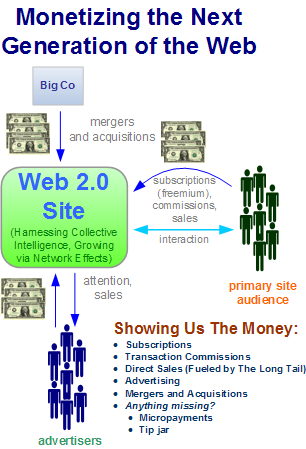Web 2.0 as the Jerry Maguire of software

Ex-Microsoft uberblogger and Podtech executive Robert Scoble is starting to really feel the weight of responsibility when running a Web startup. Investors have provided cash flow to speculate on the company's prospects and now it's up to him to find a way to make it all work. Pointing to a great write-up on the challenges of Web 2.0 revenue by Ajit Jaokar, Robert's mind is clearly on how he's going make it happen:
[O]ne thing I’ve learned in my life is that VC’s want their money back. Oh, and they are hoping you’re gonna give them nine more bags of money the same size along with that payback.
Life isn’t easy for entrepreneurs and the pressure is on. What do I do to add value? $30 million worth?
Whew, that’s a challenge. Any ideas?
Part of the issue is that most of the good markets are already dominated by a few leading players. The biggest opporunities are to either 1) create an entirely new market and 2) use disruptive technologies to upset existing market leaders (like MySpace is apparently doing.)
Interestingly, traffic sizes and the audience potential on the Web is greater than ever. This is theoretically providing an enormous still-largely-untapped opportunity to be disruptive and establish entirely new markets. However, the mechanics of making startups successful with these techniques still remains elusive.

As I wrote in detail a few months back, essentially agreeing here with Phil Wainewright, the big money models on the Web are subscriptions, commissions, and advertising. Companies like Google are largely based on advertising revenue. eBay on transaction commisions. Amazon on direct sales. Then there is the growing crowd of "freemium" services (a great term popularized by Fred Wilson), which are arguably companies like Salesforce.com and 37signals.
The alternative, winning customers through traditional linear growth processes doesn't seem promising. Even ostensibly successful and extremely well-known Web 2.0 startups like 37signals are still going for additional investments (Jeff Bezos and 37signals just announced a widely covered private equity investment) despite having quite large user base and paying customers. It's clearly hard going. Even MySpace, now probably the #1 site on the Web today, is said to be struggling to exploit its position, despite an unbeatable onslaught of eyeballs, brand growth, and media attention.
What's a Web 2.0 startup have to do in order to succeed?
It might just be about being the very best in your space
One big concern I've heard voiced time and again is that the near-zero cost for customers to reach a company anywhere in the world means that it's essentially free to switch to a competitor. Thus, all things being equal, why wouldn't you be going the very best site for x, where x is the best online store, best online community, best advertising service, or whatever. The answer, in an age where brand loyalty is being redefined, is that you generally woulnd't.
If I have advice for Scoble, I would say making Podtech the very best in its market will be the likely answer for his woes, if not very helpful or actionable advice.
Achieving market traction in a startup enviroment is hard. Startups are messy places filled with chaos, uncertain roles and responsibilies, and little organizational wisdom or history to leverage (though usually plenty of individual capability.) In my experience working with them, getting the team cohesion going and shipping a product is usually so difficult by itself that there is little time or resources to focus on making the product the absolute market leader.
While Web 2.0 development encourages rapid feedback loops in both the development and user contribution process, the fact is that creating a product development process that results in the most superior product is one of the trickiest jobs in the business. The ones that can do it successfully and become the next Flickr, Writely, or 37signals are exceedingly rare.
At the end of his post, Robert says he almost erased it, "cause it just is boring to most people to think about business models." But it remains fascinating to those who can see the vast potential and distant possibilities. Despite the somewhat bleak picture I paint here and as Ajit pointed out in his write-up, I do find there are real-world examples of entirely new and successful business models emerging on the Web that show these potentials are beginning to be realized.
Yet reality still holds: A great many startups, as well as traditional companies trying to use enterprise-style Web 2.0 for competitive advantage, will discover that being #1 or #2 in the market is the only real way to get the scale and market leadership needed to flat-out win.
Update: Jason Calacanis has some fascinating things to say about money flowing in an interesting direction on the Web; the trend of paying bookmarkers. A small trend perhaps, but perhaps very long tailish.
Update 2: Just came across this great new bit by Scott Karp about the reverse problem; companies like YouTube and MySpace appropriating the content of their users for their own profits. This is kind of expected but it's not very democratic and may eventually become a key issue as content contributors decide they want a piece of the action.